

BENEFITS OF A PLACEMENT
This guide provides a common set of expectations to help students understand and manage the placement experience and to ensure all are fully aware of and compliant with the legal, insurance and health and safety requirements of a placement. It makes students aware of the support available to them to find, apply and undertake a placement. It does not provide guidance on training placements such as teacher training, allied health and social work. Detail on procedures for training placements is provided by the relevant Faculty.
Whether you’re doing a work placement module or the volunteering module, doing a placement as part of your course is a fantastic way to gain work experience in a field related to your studies. This is becoming more important and a recent survey of employers affirms that ‘Across the best 100 Student Employers, 59% of their placement students and interns were offered graduate jobs.’ (ratemyplacement.co.uk 2025).
With a placement, you could not only gain industry insight, make some key contacts, and clarify your career goals but also increase your chances of finding graduate employment.
HOW WILL A PLACEMENT BENEFIT YOU?
The University recognises placements as an essential contribution to students’ employability; developing curiosity, confidence and capabilities. Doing a placement, will provide authentic learning situations where you can use your experience to articulate your skills, attributes, knowledge and experience.
A placement will enable you to:
F Make your CV stand out.
F Try out different career options.
F Develop your thinking based on the real world.
F Network with employers to boost your chances post University.
F Gain confidence of your abilities.
F Put your knowledge and skills into practice.
F Work with new people in new settings.
F Gain new skills and experiences.
WHAT’S IN IT FOR THE EMPLOYERS?
Employers will benefit from your knowledge and fresh ideas for a project or specific piece of work. They will also benefit from your motivation, dedicated skills, and energy
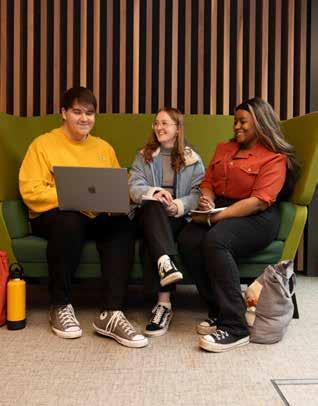
‘The student was exemplary. They were proactive, efficient, and professional, and integrated fully into the team. They took each task in their stride and always produced high quality work. They had a good attitude and threw themselves into every challenge. We were so impressed we offered them a part-time role within the firm to do alongside their final year at university.’
Placement organisation feedback 2025
PLACEMENT OPTIONS AND HOW TO FIND A PLACEMENT
WHAT ARE MY PLACEMENT OPTIONS AT WINCHESTER?
The placements available to you will depend on which programme you are studying. For full details of the placement options open to you, please enrol on the relevant canvas page by scanning the QR code below.
Work Placement Module
You can take a work placement with a company, charity or not-for-profit organisation.
Volunteering module placement (single module)
Please find an opportunity within the not-for-profit sector. More details about the minimum required duration for your volunteering can be found on our Volunteering Module Canvas page). You may also have to commit for a longer period if required by the organisation.
CANVAS
By joining our work placement support and/or volunteering module pages on Canvas you can:
F Learn how to get started on your placement journey.
F Find out what support you can expect along the way.
F Get help with job sites, LinkedIn and how to utilise your existing networks.
F Receive notifications of the latest placement jobs.
How to Register
Scan the QR codes to enrol:

Work Placement Support
‘This experience has given me a massive insight into the profession, and taking the placement module was the best decision I made!’
Student feedback 2025
CAREER CONNECT
By registering with CareerConnect you can:
F Book appointments to discuss your career planning in more detail.
F Search and apply for work placement and volunteering opportunities and set your alert choices to receive relevant placement notifications.
F Be the first to hear about upcoming careers events.

Volunteering Module Support
‘I would say definitely give volunteering a go if you can, it will set you apart from others going for the same role. It will show you are committed, reliable and can work with different types of people. I wouldn’t be where I am now without it and I’m so grateful for that opportunity.’
Student feedback 2025
HOW DOES IT WORK?
It is your responsibility to to source and secure a placement, but the Careers and Opportunities Team is dedicated to helping you plan your future, find and apply for placements, and build your connections. We have many links with potential organisations across the local area as well a national links. We will also help you develop your skills and create some great selfmarketing tools like your CV and LinkedIn profile.
WE ARE HERE TO HELP YOU WITH:
F In-curriculum placement sessions, and employer events.
F Your options, your motivation, values, and achievements.
F Developing professional applications, including CVs and cover letters.
F Directing you to the latest placement opportunities.
F Applying for the Winchester Employability Fund.
F Assisting with completing placement forms and your InPlace application.
Reminder
F A placement is an approved period of assessed learning in a workplace included in a course.
F You are required to find your placement, however, there are many resources to support you.
F If you are doing the Volunteering Module, your placement must be with a charity or not-for-profit organisation.
F By signing up to CareerConnect you can sign up to receive placement alerts.
F Focus your social media channels to actively notify you of opportunities.
F Future employers actively look for those who have work experience and/or volunteering work on their CV.
F Most students have an excellent experience on placement and gain professional skills and a positive insight into the world of work.
VOLUNTEERING WEBSITES:
For a list of local charities and not-for-profits who have worked with us before, please take a look at the Work Placement Support and Volunteering Module Support canvas courses.

FINDING A PLACEMENT
Many placements are not advertised, especially in smaller companies and charities. Make a shortlist of some organisations you would like to work for which don’t have advertised placements. Be proactive by sending them a speculative application; the careers team can help you with this and we have some fantastic resources to help you HERE. Make sure you search the company website or give the organisation a quick call to identify a suitable contact within the company.
Large companies will begin to advertise their sandwich year placements from as early as September or October for a summer start date so don’t leave it too late to begin your search. Smaller organisations may advertise later in the year or may not even advertise at all!
What else can I do?
F Sign up, via CareerConnect, to our numerous employer events to meet organisations and discuss placements. These include:
• careers fairs
• placement pop-ups
• in-curriculum sessions
F Research organisations that you are interested in and can realistically travel to then draw up a shortlist to contact.
F Check out our video guides HERE for advice on interviews and applications as well as how to write CVs and cover letters.
F Tailor your CV and cover letter to every role you apply for. Organisations will often dismiss applications that are not specific to them.
F Book an appointment with a member of the Placements Team if you need help.
When asked about the most reliable predictors of graduates’ skills and attitudes, the majority of employers (72%) agreed that graduates who completed an internship or placement arrived with better skills and attitudes than other graduates.
Institute of Student Employers Report, 2023
Having acquired an in-depth knowledge and understanding of the business – and demonstrated their abilities and potential – former interns/placement students make highly favourable candidates for graduate positions.
Gradcracker, 2023

BEFORE YOU BEGIN YOUR PLACEMENT
You will need to complete a Placement Learning Plan. You can find this document on our canvas homepages.
KEY ACTIONS ONCE YOU HAVE SECURED YOUR PLACEMENT
You will need to complete the following and upload all documents to InPlace, our online placements database, before you begin your placement:
F Complete your your Placement Learning Plan
F Obtain your organisation’s Public and Employer Liability certificates.
F Check if you need to complete a DBS check (see page 6) and, if you do, contact Registry. Enquiries@winchester.ac.uk to carry out these checks.
F If your placement is overseas (see page 8), ensure that you have completed the Overseas Placement Form, which you can find on InPlace.
F Complete your InPlace application, including the Risk Profile (see page 13).
Once you have completed and submitted your InPlace application, it will be assessed by your Placement Module Lead, who will be responsible for approving your placement.
You will be unable to start your placement until your position has been approved through InPlace.
INSURANCE DOCUMENTS
You will be required to obtain the Employers’ and Public Liability Insurance details for your host organisation, which you will then need to upload to InPlace. Organisations should be happy to provide you with their insurance documents. Please note that these must be genuine insurance certificates that are within date when you begin your placement.
If you are unsure how to word a request for insurance documents, we have prepared a template for you that is available from our canvas pages.
What if my placement organisation is a sole-trader?
The insurance industry has agreed that students
on work experience placements should be treated as employees for the purposes of insurance. Such placements must conform to the requirements of the Education Act 1996 and any other regulations in force at the time. Most Employers’ Liability policies will have a definition of “employee” that covers students on work experience placements.
Some businesses are not required to have Employers’ Liability insurance; companies with no employees or family businesses that employ only family members. However, if your placement organisation does not have Employers’ Liability insurance, they must take out Employers’ Liability insurance for the duration of the placement in order to be covered.
All existing regulations for the protection of persons at work, for example under the Health and Safety at Work Act, will apply equally to persons on placements. Further information about the employment of young persons can be found on the Health and Safety Executive website.
Sole traders may have a Public Liability insurance policy. This will not cover students whilst on placement. Most Public Liability policies will cover any accidental injury or damage to third party property arising from the actions of the placement student. Organisations should check their policy document and if they are in any doubt about the adequacy of coverage, contact their insurer or the broker who arranged the policy.
DATA PROTECTION AND CONFIDENTIALITY
The University is compliant with the UK GDPR and will continue to be compliant with all subsequent data protection legislation. Your personal identifiable data will be processed and shared with employers and placement providers for the purposes of assessment and administering your placement. Your personal information will only be shared with appropriate contacts within both the University and the provider. For more information about how the University processes your information please see the privacy notice HERE
The University uses InPlace, a placement management system, to record details of student placements. Students will be asked to record elements such as their host organisation’s details, a risk profile for the placement, insurance documents for their host organisation and details of work to be carried out whilst on placement. This information is then assessed by the student’s Placement Module Lead, who will have final say in whether or not the placement is approved. You can find details of InPlace’s privacy policy HERE.
Whilst on your placement, you may have access to commercially sensitive information. This could relate to the placement provider or personal information relating to its employees or customers. This information

is shared with you in complete confidence and any breach of that confidence will be taken very seriously by the University and the placement provider. This could include a student disciplinary process. If you have any questions or concerns with sharing information, please speak to your Placement Module Lead.
SAFEGUARDING
If your placement or volunteering role involves working with children or vulnerable adults, you’ll likely need to complete a Disclosure and Barring Service (DBS) check, which is a background check to ensure you’re suitable for working with those groups. The University facilitates this process, but you are responsible for paying the fee. Please note that, even if you already have a DBS certificate, you will still need to obtain one through the University before commencing any placement or volunteering with these groups.
Please give as much information as you can when you complete your Placement Learning Plan and upload it to InPlace. Your academic supervisor will assess the need for a DBS check and, if one is needed, you can then apply through the University Registry team. More information about the DBS can be found HERE
‘We love the dedication and compassion that Winchester Uni Students show when they volunteer with us. Their willingness to step into an environment that is challenging at times should be applauded. We particularly love to see their confidence grow during their time with us.’
Placement organisation feedback 2025
INTERNATIONAL STUDENTS
The majority of international students will be eligible for a Student Visa (Student Route). It is the student’s responsibility to check and adhere to the conditions of their visa. International students are normally permitted to work in the UK, provided the following conditions are met:
F A maximum of 20 hours per week during university term time. UKVI have defined a ‘week’ as a 7-day period starting on a Monday and ending on a Sunday.
F Work with no limit during official vacation periods only. Be aware that official vacation periods differ for undergraduates and postgraduates. Postgraduate students are not considered to be on vacation during the summer months.
F Student Visa (Student Route) holders are not permitted to:
• Be self-employed or engage in any business activity
• Take employment as an entertainer
• Take employment as a professional sportsperson, including sports coaching
• Accept/fill a permanent position of full-time work, unless:
It is for a Student Union Sabbatical Officer position
They are awaiting a decision for the Graduate Route Visa or Skilled Worker Visa and have met any other necessary UKVI requirements
F If the student holds a Student Visa (Student Route) for a part-time course, they will not have the right to engage in or undertake any paid or unpaid work in the UK.
F If the student holds any other type of immigration permission, they must be able to provide evidence that work placements are within their immigration conditions.
F A Student Visa (Student Route) holder can undertake a placement if:
• The placement is an integral and assessed part of the course.
• The work placement is no longer than 50% of the total course length (unless there is a statutory requirement for the course to contain a specific period of work placement which exceeds this limit).
• The employer is monitoring attendance/ engagement and is reporting back to the student’s university.
F It is important that the placement is reported to the UKVI once it has been approved by both your Placement Module Lead and International Student Success. Students are not permitted to start their placement until after it has been approved and reported to the UKVI.
F Should a Student Visa (Student Route) holder wish to volunteer, the opportunity needs to meet certain conditions, for example:
• Volunteers do not have a contract and must not replace an employee.
• Volunteers are not paid, however, reimbursement of reasonable travel and subsistence expenses is acceptable.
F Please note, according to UKVI regulations, “Voluntary work” is seen as different to volunteering. Voluntary work is considered as unpaid employment and will count towards your weekly hours of work.
Please contact international support@winchester. ac.uk if you have any questions.

OVERSEAS PLACEMENTS
An overseas placement means any placement that takes place outside of the UK. If you are an international student who is returning to your home country to do a placement, this is also classed as an overseas placement.
If you have secured an overseas placement, you will need to factor in enough time to have the placement reviewed and approved, through the overseas placement process, before you begin your placement. To apply for overseas placement approval, you must log in to InPlace and click to access the Overseas Placement Application (see page 16 of this guide).
You will receive an automated notification when your application has been approved, which you will then need to upload to your InPlace application.
You are then required to complete your InPlace application and obtain approval for your placement from your Placement Module Lead before your placement starts.
Please note that it can take up to one month for your placement to be approved so please leave sufficient time for this process to take place before your placement is due to start. If you submit your overseas application with less than a month to go before beginning your placement, we cannot guarantee that your placement will be approved.
It is your responsibility to check the Foreign, Commonwealth and Development Office (FCDO) Foreign Travel Advice pages one month before your placement is due to begin. The University’s Health and Safety team will monitor conditions in the host country prior to and during the placement. If the University, FCDO and the insurance provider advise against travel, then the student must reconsider their placement location.
It is recommended that you refrain from booking travel and accommodation until your placement has been approved. The University’s travel cover will provide travel and emergency medical cover for students on placements if approved by the University. University approval must be obtained at least four weeks before but will only take effect from four weeks before the
placement is due to commence. If you choose to book travel and accommodation before approval by the University and the University’s travel cover takes effect, you do so at your own risk.
HEALTH AND SAFETY CONSIDERATIONS FOR PLACEMENTS ABROAD
For placements abroad, we advise that the placement cannot be determined as ‘low risk’ on the InPlace risk profile. Therefore, students travelling abroad to work must assess all aspects of the risk profile and give details.
To help prepare your students for working abroad, we recommend that the following topics are taken into consideration.
Travel arrangements
F Students should pre-arrange their flights and transfers to and from the placement location. They should be clear about where they are going to and ensure that they have plenty of time to make any connection journeys.
F Accommodation – students should ensure that they have suitable accommodation booked before departing.
F Bear in mind the effects of long-haul travel (jetlag, fatigue) and how to avoid them.
Personal safety
F Students should research the area they are travelling to prior to departure and avoid ‘nogo’ areas and areas of high crime. This link offers government guidance on safety when volunteering or travelling overseas.
F Safe use of public transport, taxis, etc. – where possible, students should only use registered taxis/buses and should pre-book taxis if necessary.
Climatic conditions
Students should consider the climate of the area they are travelling to (e.g. higher temperatures, monsoon seasons, arid conditions, extreme winter conditions) and pack accordingly.
Health risks and vaccinations
F Venomous animals and insects
F Contagious diseases
F Students can refer to the NHS Fit for Travel website for vaccination information for every country, and check that their vaccinations are up to date.
F Students should avoid consuming contaminated drinking water and food.
F For some countries it may be advisable to drink bottled water only.
F Students will need to apply for a GHIC card online.
Cultural differences
Other countries may live by different customs and/or speak another language. To avoid causing offence to locals or breaking the law, it is advisable that students familiarise themselves with the ‘cultural norms’ of their placement country, such as the following:
F Accepted behaviour
F Local laws and religions
F Dress codes
F Alcohol use
Obtaining medical or other emergency Assistance
Local healthcare arrangements and contact number(s) of local emergency services should be noted before beginning an overseas placement.
LIABILITY INSURANCE ABROAD
You will need to check if your placement provider has appropriate insurance in place to protect you while undertaking your placement. You will also need to check the country’s guidelines on insurance. Some countries do not require businesses to have such insurance or may have insurance schemes in place which are similar but do not provide the same level of liability cover.
It is essential that you include attachments of insurance certificates in your InPlace application. If the placement provider does not offer this, you must notify your Placement Module Lead.
The University’s travel cover will provide travel and
emergency medical cover for students on placements if approved by the University. Please note that if you make any travel arrangements before your placement has been approved by the University, you do so at your own risk as you will not be covered by the University.
If you are seeking to gain employment experience that is not formally part of your course, you will not be covered by the University’s travel cover and should arrange your own cover.
If the University, FCDO and the travel cover provider advise against travel, then you must reconsider your placement location. Insurers will not normally permit travel in these circumstances as it is not possible to guarantee that you can be evacuated in the event of an emergency.
Your safety is our greatest concern. If the work placement is planned in a country where the FCDO has raised concerns but not advised against travel, then you must include this information in the risk profile section of InPlace, and this must be approved through the University’s international placements process.
Ultimately, if our travel cover provider considers that the risk of travel is too high for your safety to be guaranteed, then travel cover may not be available. Under these circumstances, the placement will not be supported by the University.
‘The student was so impressive, with their confidence and adaptability. Their attitude towards work and the tasks we set them was 10/10. They were a real pleasure to have in the studio and they brought a good energy into the workplace.’
Placement organisation feedback 2025
STUDENT INPLACE GUIDE
OVERVIEW
The University of Winchester uses InPlace to help you manage your work placement and/or volunteering opportunity.
With InPlace you can:
F Fill in details of your placement, organisation and complete your own Risk Profile.
F Upload your organisation’s public/employer liability insurance. Please note that sole traders may only have public liability insurance.
F Track the progress of your upcoming placement via your desktop, laptop, smartphone, or tablet.
F Use your homepage to check for tasks you need to complete and view notifications you need to be aware of.
F View organisation (InPlace calls this “agency”) and placement details after a placement is confirmed.
F Keep track of your placement schedule and other engagements using the Calendar.
F Upload relevant documents, complete placement surveys and much more!
Logging in
You can find the InPlace link on the Intranet, relevant Canvas page or by navigating to inplace.winchester.ac.uk
When the page loads, click on the “Staff and Students” button then use your normal University log in to access InPlace.

The Home page
Once logged in the screen below will be displayed, with an example 2022 Events Management 30 day PT Placement showing.
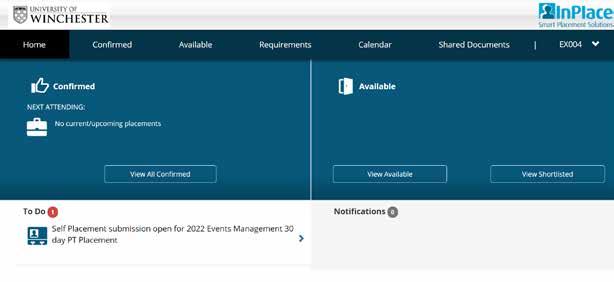
The “Home” tab shows you an overview of the placement options available to you (listed under “To Do”), this will be the module you have chosen as part of your options or will be a year sandwich placement option.
The “Confirmed” tab will show you any placement you have previously submitted via InPlace. “Requirements” tab will display what is required for any placement you have opted in to, for example a 30-day placement would show you the below:
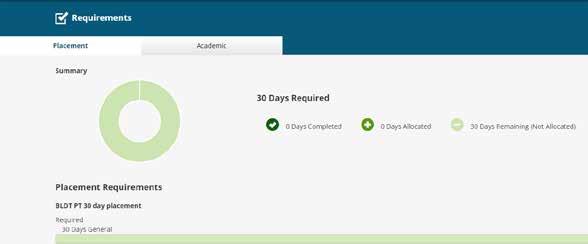
Please note – you will need to gather documents from your employer to upload during the Registering Your Placement section below. These are:
1. Placement Learning Plan
2. Your host organisation’s public and employer liability insurance certificates. If you haven’t got these yet you can click the “Save as draft” button and return once obtained.
Registering your secured placement
Once you have secured your placement, you will need to complete the InPlace application form. To do this, log in to InPlace as above and then from the “Home” tab, under the “To Do” section, click on the placement you wish to register.
Once the Placement Details screen loads, scroll down to “Provider Details” and begin entering the information required as you won’t need to alter the weekly placement roster or placement details section. Provider name is the

organisation you will be working for. Please note, you can click the “Save as Draft” button at any time during the application process.
You will then have to complete information for the “provider contact details”. This is often the person that has hired you. Please ensure you complete all required fields.


There may be occasions when you need to provide another contact from the organisation you will be placed with, you can provide those details under the “Contacts” section. Please note, if the contact here is the same as the provider contact already complete, you can just tick the “Contact person is the placement supervisor” box, this will copy all the information you have already completed.

The next step is to complete your own Risk Profile, this is a series of risk areas we want you to think about and to rate each area as either High, Medium, or Low overall, considering all risk factors – you will then be required to type explanations into the relevant comments box.

Work and/or study factors could include the following:
High
F Potential risk that may cause permanent injury, including working at height, manual handling and/or working with/maintaining electrical systems, operating manufacturing plant or equipment such as weights, ropes or moving parts.
F Working with vulnerable groups of people or location, (e.g., vulnerable adults, children).
F Activities that need specific licences or qualifications, (e.g., diving, security, REPS, coaching, SIA).
F Work involving significant risks in small companies that do not have professional health and safety advice, (e.g., gym instructor, sailing instructor, fitness and personal trainer, coach).
Medium
Working close to the above high-risk factors, but not directly with them, (e.g., events assistant, event co-ordinator, working at home, wedding planning assistant).
Low
Office work or other low hazard (risk) environments and activities, (e.g., marketing assistant, web developer, retail systems consultant, assistant account manager, office-based events coordinator).

Location and/or regional factors could include the following:
High
F Significant risk of danger in the area – e.g., placement in war zones, or any countries/ regions where the FDCO advises against travel. These examples are considered extreme. The University will not be able to support these placements and we strongly advise against travel to such destinations.
F Locations where the student can expect that most of their work and communication will be in a language that they are not fluent in.
F Lone or remote working where local infrastructure is underdeveloped, so transport, medical and rescue services are not available quickly or locally.
Medium
F Placements abroad (including inside the EU) should be medium risk unless the location is determined as high risk.
F Higher than normal risk of civil disorder, crime, or comparable danger.
F Delays in communicating with tutors and others – (e.g., due to lack of communications/connections, mobile network coverage and Wi-Fi).
F Locations which have diverse cultures and customs to the UK, (e.g., appropriate behaviour, dress codes, religion, etc).
Low
Placements in the UK with no significant local risks.

Travel and transportation factors could include the following:
High
F Significant travel to the building where the placement is based or travel on public transport facilities known to be high risk (e.g., abroad, or unknown).
F Placement requires students to drive other people in unfamiliar vehicles (e.g., minibus of school children).
Medium
F Night travel or long daily commuting required (one hour or more).
F If students are driving for business-related purposes (i.e., not commuting, but driving between business sites, for example), then they will need to have ‘business use’ on their personal motor insurance.
Low
F No significant travel, comfortable daily commute (less than an hour on known roads).
F No driving associated with placement.

General and environmental health factors could include:
High
F Regional/local health risks require specific health protection measures (e.g., vaccinations).
F Very hot /cold or strenuous working conditions (e.g., manual working, working outside or in the sun).
Medium
F Regional/local conditions require some action (e.g., optional vaccinations)
F Occasional working outside.
Low
F No significant environmental health risks.

Personal student factors, select either “Yes” or “No”, if you have selected “Yes” then please give details.

Insurance limitations, again select either “Yes” or “No” here together with an explanation if you have selected “Yes”
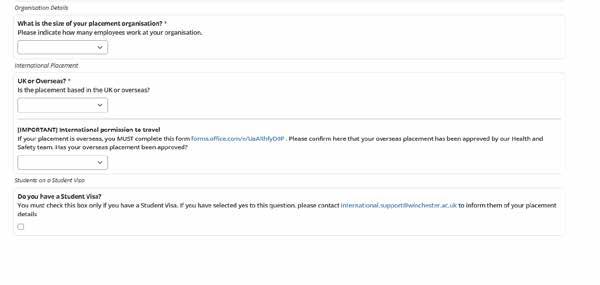
OVERSEAS PLACEMENTS
If your placement is based in the UK, please select ‘UK’ from the drop down menu, pictured above.. If your placement is abroad, please select ‘overseas’ from the drop down menu and click to complete the linked Microsoft Form. Guidance on this process can be found on page 8 of this guide.
PLACEMENT DOCUMENTS
For your placement to be considered, you will need to gather certain documents relating to the job you will be doing. If you haven’t gathered these yet you can click the “Save as draft” button at the bottom of the screen.

PLACEMENT LEARNING PLAN
You will need to upload a Placement Learning Plan (see page 5 of this guide). This will include details about what you will be doing on placement. Once you have completed your document, you can upload it by either clicking on ‘select or drag file’ or by dragging the file to the box provided. You should then select ‘yes’ from the drop down menu under ‘Learning Plan Uploaded’.

PUBLIC AND EMPLOYERS LIABILITY INSURANCE
You should obtain your organisation’s insurance documents and upload them here. You should upload both the public and employer liability insurance certificates.
Submitting your application
Please upload any additional documents and give any further details that are relevant to your placement. Please do not upload DBS certificates here.
Once you are satisfied that you have completed all sections accurately and fully, please tick the self-declaration box and submit your placement application form by clicking the ‘submit’ button at the bottom right of the screen.
ON PLACEMENT
WINCHESTER EMPLOYABILITY FUND
The Winchester Employability Fund can provide support to students, who meet the eligibility criteria, with expenses related to placements, volunteering or work experience. The opportunity may be an assessed part of your course or undertaken independently of your course. You can find more information by clicking on this link.
PROBLEMS WHILST ON PLACEMENT
Most students have a great time whilst on placement and come back to university having developed a range of exciting skills and contacts. However, we recognise that occasionally things don’t go to plan and this section aims to explain what to do if you have a problem.
If you are experiencing any problems whilst on placement relating to the placement itself, you should follow your organisation’s internal procedures. This may involve having a professional discussion with your supervisor to explain your concerns. This can be daunting and you can contact your Placement Module Lead or workplacements@winchester.ac.uk if you want help with knowing how to do this.
For serious concerns, or if your discussion with your supervisor doesn’t resolve the problem, you must contact your Placement Module Lead. You can also contact the Placements Team on workplacements@ winchester.ac.uk, Make a 1:1 appointment with a Placement Coordinator via CareerConnect or pop into SAB303 if you need to speak to us at any point.
You must report any concerns of behaviour towards you while on placement that might be harassment or sexual misconduct as defined in in the University’s Bullying, Harassment and Sexual Misconduct Policy
You can access the University’s Report & Support web page HERE and you should contact your Placement Module Lead so that the University can provide support and take appropriate action.
Whilst on placement students can access Student Support and Success services. More details are
available HERE or via our Work Placements and Volunteering Module canvas pages.
STUDENTS’ WELLBEING, DISABILITY AND THE PLACEMENT PROCESS
It’s so important it is to look after your mental and physical wellbeing while at University, including when on placement. If you have a physical or mental health disability, or are neurodiverse, please make sure you know how to access the right support. The term “disability” covers many types of health conditions both physical and mental, specific learning difficulties and neurodiverse conditions. Any of these entitle you to access extra support during both the recruitment process and in the workplace.
It is important for you, as a disabled applicant, to know that The Equality Act 2010 protects those with a physical or mental health disability against discrimination when applying for jobs and less favourable treatment when in employment.
Employers also have a legal duty to make ‘reasonable adjustments’ to reduce or remove obstacles disabled people may face in the recruitment process and workplace and ensure that disabled employees are able to carry out their duties without being disadvantaged compared to others.
We work closely with students, graduates and employers to ensure opportunities are equal and inclusive for all. We are keen to support our disabled students in the transition from study to the workplace and our Disability and Learning Diversity Team can provide tailored support for students with a disability/ dyslexia, information on Disabled Students Allowance (DSA- inc. non-medical help), Assistive Technology and Learning Agreements. There are further resources available on our Work Placement Support and Volunteering Module canvas pages. You can also find advice and support on the Student Support and Success intranet pages.
If you have a disability and/or an additional learning requirement or need any kind of assistance during your placement in the workplace or in accessing a
placement, you can receive support from the Disabilities and Learning Diversity Team, who can provide advice as to:
F How to share information with your employer about your disability or support needs.
F Information about adjustments that your employer could make to support you to work comfortably and thrive in the workplace.
F How to navigate workplace cultures with a disability and or/adjustment needs.
While on placement, you are still a student at the University and can still access the support from the Disabilities and Learning Diversity Team via disability@winchester.ac.uk or telephone 01962 827341.
If you feel you need some support with your mental wellbeing you can contact the Mental Wellbeing Team at mentalwellbeing@winchester.ac.uk, or book an appointment here: Mental Wellbeing Appointments | Winchester
EQUALITY, DIVERSITY AND GDPR
The University’s Equal Opportunities Policy will apply to organisations providing placements. There are a range of protected characteristics,
against which it is unlawful to discriminate when choosing someone for a job, considering people for promotion, dismissal or redundancy. For more information, you can check the government’s guidelines HERE. Further information is available through the Equality and Human Rights Commission
PLACEMENTS VISITS /HOURS WORKED
A placement visit may be arranged by the Placement Module Lead while the student is on placement, either online or in person depending on the location of the placement and if the placement is longer than 3 months.
It is the student’s responsibility to:
F Consult with the University prior to seeking any changes in the terms and duration of the placement. A revised risk profile may be required and should be submitted to InPlace.
F Keep a record of the number of hours worked while on placement.
Notify the University if their placement ends early for whatever reason.
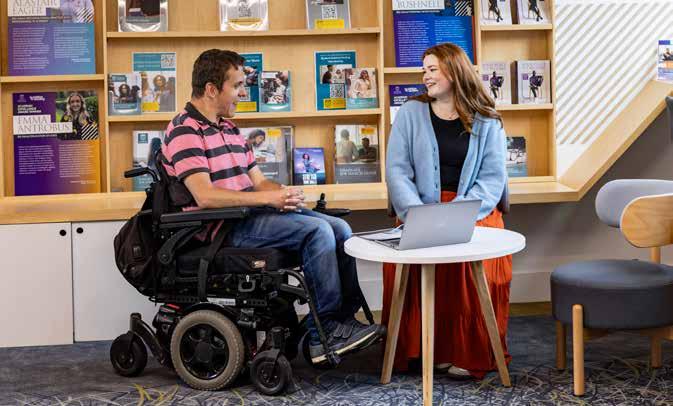
STUDENT INDUCTION CHECKLIST
When you begin your placement, you may wish to refer to this checklist to help support your induction.
F ☐I understand the days I need to attend my placement, the start and finish times for each day and I know when I can take my lunch and break times.
F I have been given an overview of the organisation and the work it does, including the products / services it provides, the industry it is in, its size and structure and whether it has a national or international focus.
F
F
☐I have been told about my itinerary for my placement, and what my role will be, including which departments I will be working in, and the type of work I will be observing, learning about, and doing.
☐I have been told about, and understand, the organisation’s policies and procedures including dress code, health and safety, and drug and alcohol use.
F ☐It has been explained to me who to speak to if I have any questions or if there is a problem.
F I have been shown the location of any food outlets, staff rooms, toilet facilities, car parking, and prayer rooms.
F I have been told if there are areas which are restricted to me or where I must always remain with my manager/an employee, due to security or safety reasons (where applicable).
F I have been told how to access the organisation’s IT systems, and I understand the organisation’s policy about using IT equipment, including the use of social media in the workplace, and when and where I am allowed to use my mobile phone.
F I have been briefed on potential hazards/ safety issues, if any, that I could be exposed to during the industry placement and I have had the chance to ask questions where this is not clear.
F I have been told about safe working practices to adhere to while on my placement.
F I have had the importance of safety equipment explained to me, such as PPE, where it is kept, which areas it must be used in and why.
F I have been told I must report any injury/ accident to my manager or a first aider immediately.
F I have been told what I should do in the event of a fire, and how I will know if a fire alarm has been raised.
F I have been told the emergency procedure and where the assembly points/emergency exits are, and I know that I should not run during an evacuation. I understand that I should speak to my manager if I am unclear which emergency exit to use on the site, in case of an emergency.
AFTER YOUR PLACEMENT
The Careers and Opportunities Team and the University of Winchester are here to help you throughout your time at Winchester and beyond! To find out more, click HERE
Make an appointment to see a member of our helpful team, or take a look at our many resources, including ways to make the most of your placement experience, HERE
GET IN TOUCH
WANT MORE HELP?
Contact us on workplacements@winchester.ac.uk and we will be happy to provide advice and support.
Join our Canvas pages for lots more help, advice, and resources (scan the QR codes at the start of this booklet)
Come and visit the Careers & Opportunities Team in SAB303.
Open Monday-Friday during term-time and vacation periods. Please see the Careers intranet page for full details.
